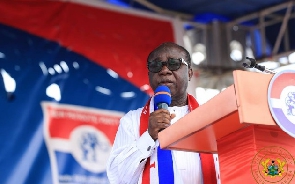The laudable decision by Mr. Freddie Blay, the Acting National Chairman of the ruling New Patriotic Party (NPP), to purchase some 275 minibuses for the use of each and every one of the 275 parliamentary constituencies of the party across the country, is not very different from the equally extravagant promise by the fourth-time running and closest contender for the party’s National Chairmanship position, Mr. Stephen Ntim, to provide a life-insurance policy for each and every party executive in the country.
If Mr. Ntim is able to carry through with his promise, that could cost a lot more than the $11 million loan facility that Mr. Blay is widely reported to have obtained from the Universal Merchant Bank in fulfillment of his campaign promise.
We also know that Mr. Ntim’s campaign promise is the far less credible of the two, if only because even as we observed in a previous column on this subject, Mr. Ntim is only prepared to foot just 10-percent of the cost of his life-insurance promise, while conveniently and rather mischievously sticking the party with 90-percent of the cost of his life-insurance premiums.
Now, if this is not an unconscionably orchestrated scam or a patent act of political criminality of the most egregious kind, I just don’t know what else it is (See “275 Buses: Amidu Will Clear Blay of Wrongdoing – Addo-Kufuor to Critics” 3News.com / Ghanaweb.com 7/7/18).
My only concern with the delivery of Mr. Blay’s minibuses which, as of this writing were reported to have arrived at the Tema Harbor, has far less to do with the source of their funding than the practical fact of whether the benefactor has made any prior comprehensive arrangement for the regular servicing and maintenance of these vehicles.
It goes without saying that during the 5-year course of the manufacturer’s warranty or the guaranteed lifespan of these vehicles, the cost of repairs of these vehicles alone is likely to at least equal the purchasing prices of each of these vehicles, especially when one takes into consideration the general quality of roadways in the country, as well as the general driving track-record of the average Ghanaian motorist.
Then also must be factored into the equation, or the balance thereof, the long-term cost of fueling these vehicles. Likewise, nearly each and every one of these vehicles will need a driver who must either be paid a stipend or even a salary.
We need to also factor in the cost of vehicular insurance, as these vehicles cannot be automatically put on the road without the purchasing of auto-insurance policies. This is where party headquarters comes in. The budget for auto-insurance payments ought to have been worked out beforehand, else the Blay promise would end up becoming just as burdensome as that of the life insurance policies that Mr. Ntim promised to provide to each and every NPP’s party executive.
Indeed, even as I observed in a previous column, the problem at stake here is one of sustainability, not the mere fact of whether or not a candidate is capable of supplying these buses to all 275 constituencies in the country, or providing life-insurance policies to all executive operatives of the NPP across the country. If these vehicles are going to be operated commercially, as I was informed by a relative while preparing this column for the press, then all the better for the salutary creation of jobs and incomes for the various branches of the party across the country.
As for the torrents of complaints of “vote buying,” on the part of Mr. Freddie Blay, I find such complaints and accusations to be both wickedly disingenuous and inexcusably hypocritical. By their very nature, political campaigns in the civilized democratic world are not “free bonto,” or money-free affairs, as Ghanaians are wont to say, even where a candidate running for office is endowed with platoons and brigades and battalions of voluntary workers.
For these volunteers invariably have to be fed and regularly bussed to the various campaign venues. Various forms of advertising have to also be taken into account by any serious candidate for office, such as the drafting and printing of hundreds of thousands of campaign posters and flyers and handbills.
As well ought to be taken into consideration the purchase of advertising time in the electronic media, especially on radio and television. Then also, capital-intensive bill boards must be mounted on highways and alleyways and commercial hubs and other communities across constituencies and regions throughout the country.
Needless to say, all these campaign materials cost money. Which is why I implacably resent this interminably nonsensical talk of vote buying against Mr. Blay and some of his political rivals and associates, almost as if democracy was all about mere talk devoid of substance. Then again, whatever happened to the practical and commonsensical maxim of “putting one’s money where one’s mouth is”?
Opinions of Sunday, 8 July 2018
Columnist: By Kwame Okoampa-Ahoofe, Jr















